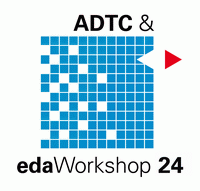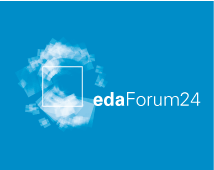Design for Testability: The Path to Deep Submicron
Tom W. Williams Synopsys Fellow and Director of R&D, Test Development Synopsys Inc.
Abstract
Design has never been simple, but at 130 nm and below – and definitely at 90 nm – it is becoming increasingly difficult. Process and lithography issues continue to drive our advance to new technology nodes. Due to the effects of scaling, defect mechanisms are no longer easily identified with single “stuck at” fault models but rather are demanding far more complex and challenging solutions. For example, shorts are now being extracted from the physical layout of a design, with special tests being created to detect them. But this is just the beginning; delay testing of all transition faults is now a new objective of Design for Testability (DfT). New demands are being made on design to not only create the correct function and help with testing but also to help yield ramp-up. Manufacturing and test are beginning to develop an even stronger relationship due to the close interconnection between yield ramp-up and diagnostics, which are supported by DfT structures included in the design.
In this presentation, T. W. Williams addresses these current challenges. In addition, he will discuss the future challenges facing designers, and the new tools and methodologies which the design community will be dealing with.
Curriculum Vitae
 Tom W. Williams is a Synopsys Fellow at Synopsys in Boulder, Colorado, U.S.A. Formerly, Dr. Williams was with IBM Microelectronics Division and served as manager of their VLSI Design for Testability group. He received an M.A. in pure mathematics and a Ph.D. in electrical engineering. He has received numerous best paper awards from the IEEE and ACM. He was twice a Distinguished Visitor Lecturer for the IEEE Computer Society. Dr. Williams has previously served on the Computer Society Board of Governors and the IEEE Board of Directors. He is a member of the Eta Kappa Nu, Tau Beta Pi, IEEE, ACM, Sigma Xi, and Phi Kappa Phi. In 1985 and 1997, he was a Guest Professor and Robert Bosch Fellow at the University of Hannover in Germany. Dr. Williams was named an IEEE Fellow in 1988 and received the Computer Society‘s W. Wallace McDowell Award for outstanding contributions to the computer art in 1989.
Tom W. Williams is a Synopsys Fellow at Synopsys in Boulder, Colorado, U.S.A. Formerly, Dr. Williams was with IBM Microelectronics Division and served as manager of their VLSI Design for Testability group. He received an M.A. in pure mathematics and a Ph.D. in electrical engineering. He has received numerous best paper awards from the IEEE and ACM. He was twice a Distinguished Visitor Lecturer for the IEEE Computer Society. Dr. Williams has previously served on the Computer Society Board of Governors and the IEEE Board of Directors. He is a member of the Eta Kappa Nu, Tau Beta Pi, IEEE, ACM, Sigma Xi, and Phi Kappa Phi. In 1985 and 1997, he was a Guest Professor and Robert Bosch Fellow at the University of Hannover in Germany. Dr. Williams was named an IEEE Fellow in 1988 and received the Computer Society‘s W. Wallace McDowell Award for outstanding contributions to the computer art in 1989.










